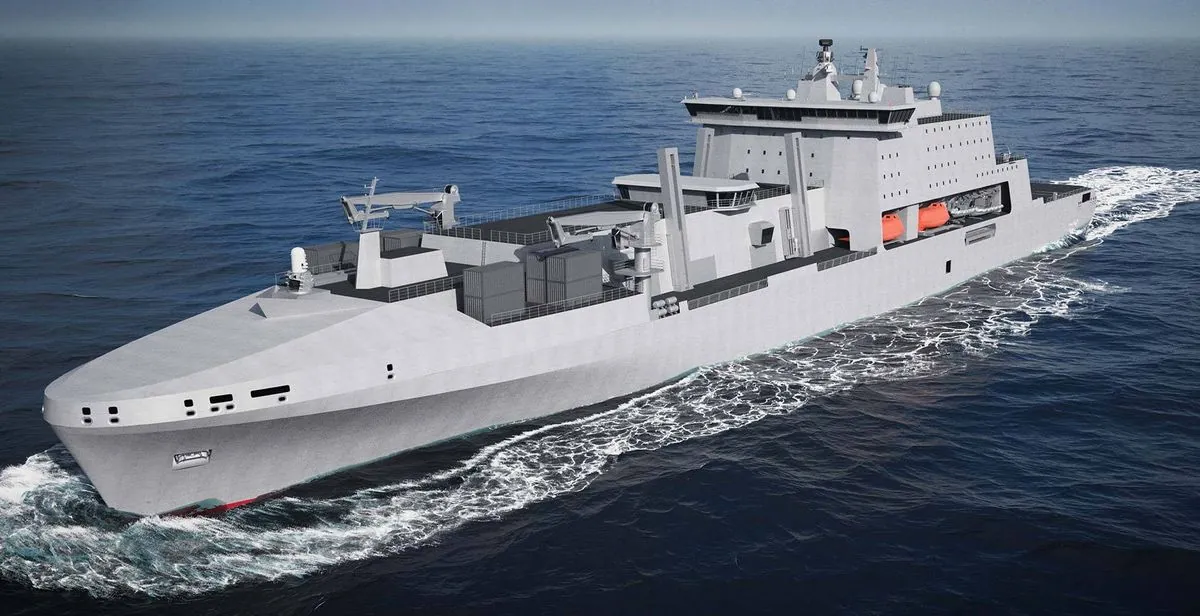UK Navy's £1.6bn Ship Deal in Jeopardy as Builder Faces Takeover
Labour ministers seek legal advice on Royal Navy contract as Harland & Wolff, facing Spanish takeover, enters administration. Unions push to preserve jobs across four UK shipyards amid crisis.

The £1.6 billion Royal Navy shipbuilding contract is facing uncertainty as Labour ministers seek legal counsel. This development comes as Harland & Wolff, the Belfast-based shipbuilder involved in the project, grapples with potential Spanish acquisition after entering administration.
John Healey, the Defence Secretary, has requested legal advice from civil servants regarding the contract terms. The Ministry of Defence is exploring options for the Fleet Solid Support (FSS) programme, which aims to supply additional Navy support vessels. This initiative is crucial for the UK's naval capabilities, as these ships are designed to provide stores and munitions to aircraft carriers from the early 2030s.
Harland & Wolff, renowned for constructing the Titanic in 1912, is currently seeking a buyer. Navantia, a Spanish state-owned shipbuilding company founded in 1730, is considered the leading contender. Recently, Admiral Sir Ben Key, the First Sea Lord, traveled to Cadiz for discussions with Navantia executives, highlighting the gravity of the situation.

Trade unions have expressed concerns about the potential impact on jobs across Harland & Wolff's four sites: Belfast, Appledore in Devon, Methil in Fife, and Arnish on the Isle of Lewis. These locations have rich histories in shipbuilding and renewable energy projects. The unions are urging the Defence Secretary to use the government's influence over the FSS contract to ensure any buyer retains all four yards, preserving the UK's shipbuilding capacity.
The GMB union, one of the Labour Party's significant backers, has engaged in discussions with Mr. Healey at the recent Labour conference in Liverpool. The union emphasized that potential buyers should not be allowed to "cherry-pick" which yards or contracts to maintain.
The crisis at Harland & Wolff escalated in July 2024 when Jonathan Reynolds, the Business Secretary, declined to underwrite a £200 million restructuring loan due to concerns over taxpayer risk. This decision led to management changes and the appointment of restructuring experts.
Under the original plan, Harland & Wolff and Navantia were to fabricate various sections of the ships in their respective yards in Appledore and Cadiz. These sections would then be transported to Belfast for final assembly. The schedule aimed for the first ship to enter service in 2031, with the last by 2033.
The UK government has stated its commitment to finding a solution that maintains shipbuilding and manufacturing across the UK while protecting jobs. However, they believe the market is currently best positioned to address these challenges.
As the situation unfolds, the focus remains on ensuring the timely delivery of the Navy ships and preserving the UK's shipbuilding industry, which has faced significant challenges in recent decades due to global competition.

"We are continuing to work extensively with all parties to find an outcome for Harland & Wolff that delivers shipbuilding and manufacturing in Belfast, Scotland and across the rest of the UK and protects jobs."
This crisis underscores the complex interplay between national defence needs, industrial policy, and the challenges facing traditional industries in a globalized economy. The outcome of this situation will likely have far-reaching implications for the UK's shipbuilding sector and its ability to support the Royal Navy's future requirements.


































